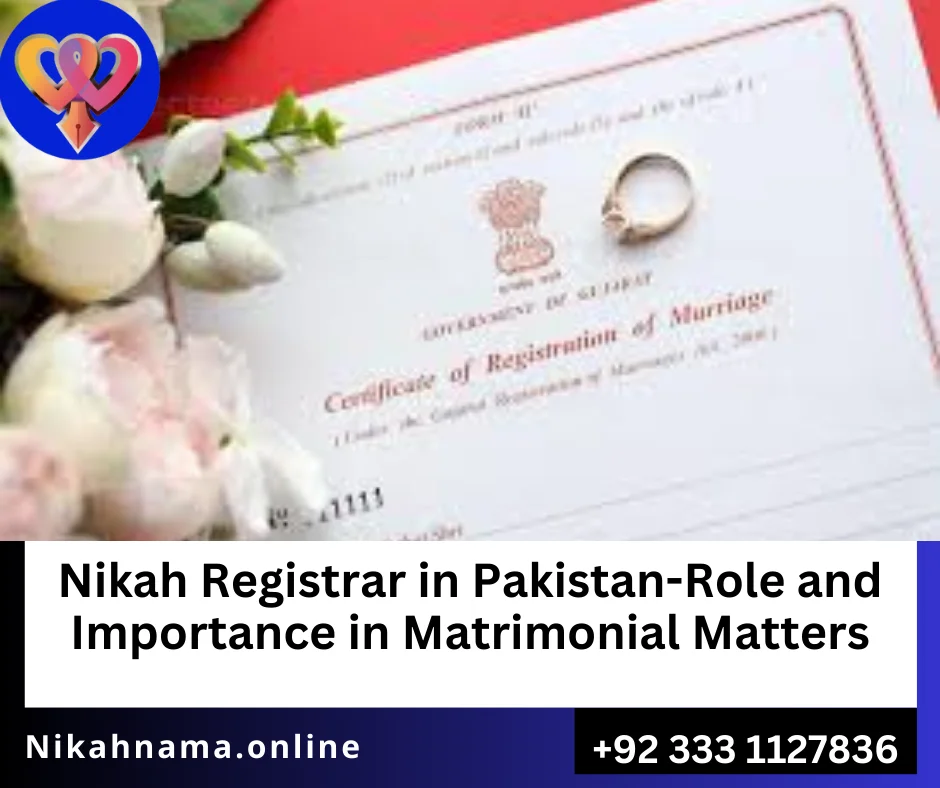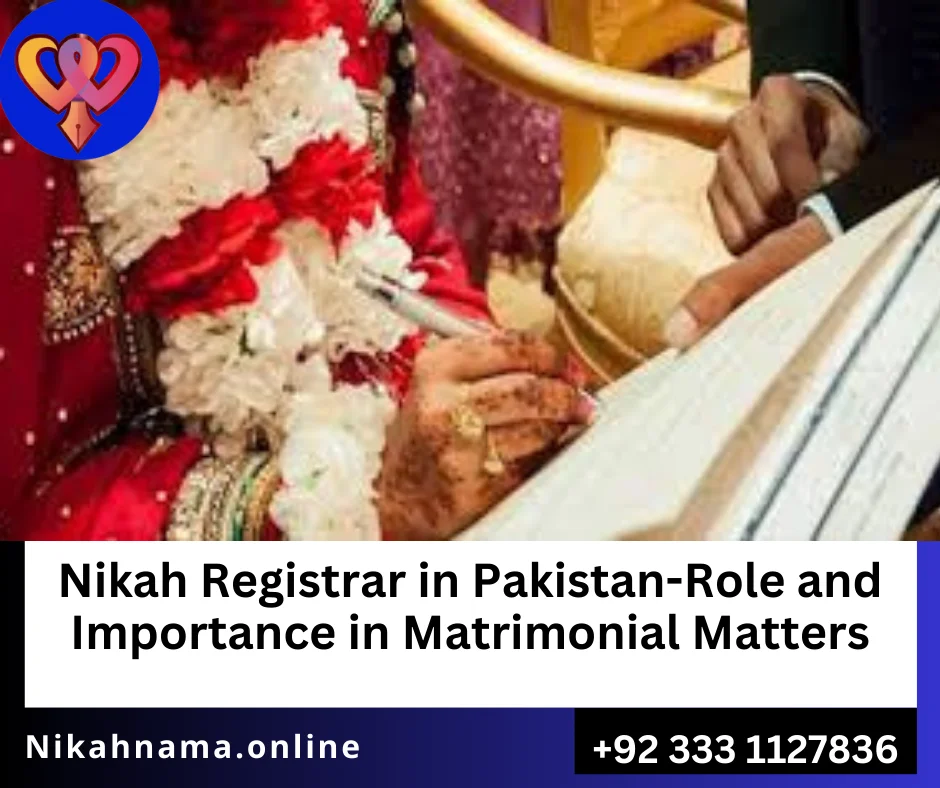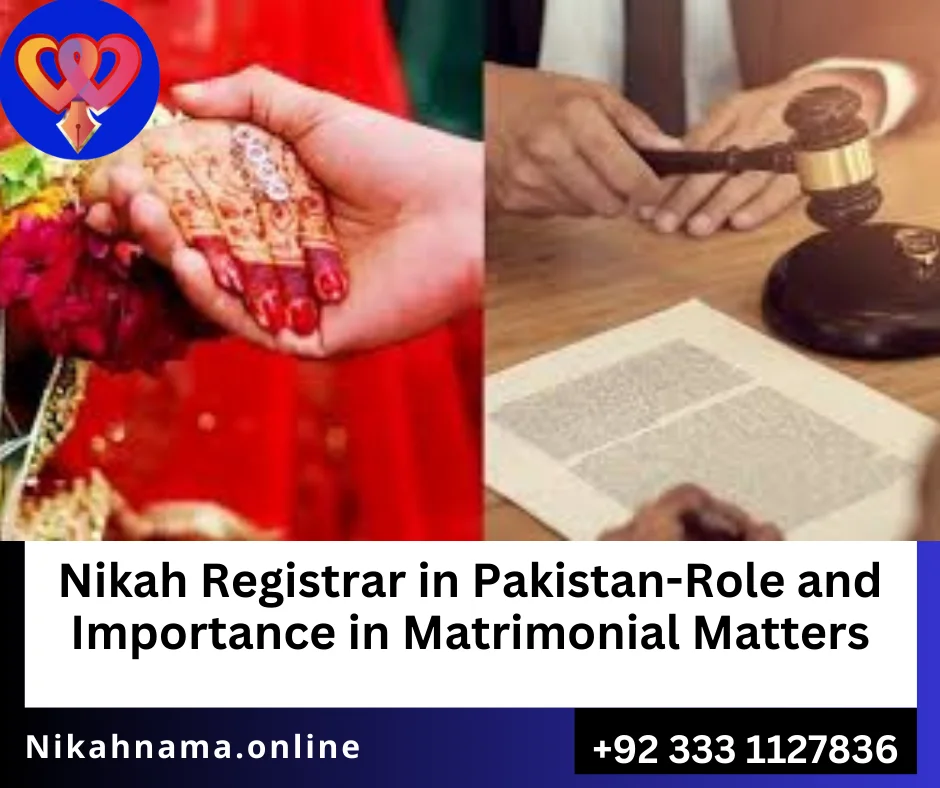Nikah Registrar in Pakistan-Role and Importance in Matrimonial Matters
The Role, Importance, and Appointment Criteria for a Nikah Registrar in Pakistan
In Pakistan, the institution of marriage holds both religious and legal significance. The Nikah, which refers to the Islamic marriage contract, is not only a solemn religious ceremony but also a legal bond that requires formal registration to ensure its recognition by the state. The person responsible for performing this vital task is the Nikah Registrar. This blog delves into the role and importance of a Nikah Registrar in Pakistan, as well as the criteria and process for their appointment.
What is a Nikah Registrar?
A Nikah Registrar is a government-authorized official responsible for solemnizing marriages and registering them according to the laws of Pakistan. In Pakistan, marriage registration is essential for both legal and religious reasons. The Nikah Registrar performs the religious ceremony of Nikah and ensures that the marriage is officially recorded with the local government authorities by completing and submitting the Nikah Nama (marriage certificate).
The Nikah Nama contains essential information about the couple, including their names, ages, addresses, the terms of the marriage, and the rights and responsibilities of both parties. The Nikah Registrar’s role is to ensure the marriage complies with both Islamic law and the Pakistani legal system.


The Importance of a Nikah Registrar in Pakistan
- Legal Recognition of Marriage
One of the most significant roles of a Nikah Registrar is ensuring that a marriage is legally recognized by the state. Without the formal registration of the Nikah, the marriage may not be acknowledged by the government, and the couple may face difficulties in matters such as inheritance, property rights, or applying for government services. The Nikah Registrar’s role ensures that these legal aspects are addressed properly. - Protection of Rights
The Nikah Nama signed by the Nikah Registrar acts as a legal document that protects the rights of both spouses. This document serves as proof of the marriage, which can be vital in cases of inheritance, divorce, or legal disputes. The Nikah Registrar ensures that both parties are aware of their rights and duties, including the rights to maintenance, inheritance, and property. - Religious and Cultural Compliance
In Pakistan, marriage is not only a civil contract but also a religious one. The Nikah Registrar performs the Islamic marriage ceremony, which includes reciting specific verses and prayers. The registrar ensures the marriage adheres to Islamic principles, making it valid both legally and religiously. - Documentation and Record Keeping
The Nikah Registrar also plays a role in maintaining proper records of all marriages performed. These records are essential for keeping an accurate count of marriages and for providing copies of the Nikah Nama if requested by the married couple or their family members.
Criteria for Appointment as a Nikah Registrar in Pakistan
To become a certified Nikah Registrar in Pakistan, an individual must meet certain criteria set by the government. The appointment process ensures that the Nikah Registrar is competent in both religious and legal aspects of marriage registration. Here are the basic requirements:
1. Educational and Religious Qualifications
A candidate for the position of a Nikah Registrar must have a solid understanding of Islamic law, particularly marriage laws (Nikah), and be able to perform the Nikah ceremony under Islamic practices. Typically, candidates should have:
- A degree in Islamic studies or a recognized religious qualification.
- In-depth knowledge of the Nikah process and Islamic principles surrounding marriage.
- Proficiency in understanding and filling out the Nikah Nama accurately.
2. Experience in Legal and Religious Affairs
While formal educational qualifications are important, experience in the field of religious or legal affairs is equally important. A candidate who has worked in a relevant capacity, such as a cleric, imam, or lawyer specializing in family law, would be favored.
3. Application to the Relevant Authorities
To be appointed as a Nikah Registrar, an individual must submit an application to the local government or relevant district office. This application typically requires:
- Personal identification documents (e.g., CNIC).
- Proof of religious and educational qualifications.
- A letter of recommendation or endorsement from a recognized religious authority or local council.
- Background checks or an interview to ensure the applicant’s competency and trustworthiness.
4. Official Appointment and Licensing
Once the application is approved, the individual is officially appointed as a Nikah Registrar by the government, and they receive a Nikah Registrar License. This license authorizes the individual to solemnize marriages and legally register them with the relevant local authorities. A licensed Nikah Registrar must renew their license periodically to remain authorized.
5. Adherence to Legal and Ethical Standards
Nikah Registrars must follow the legal framework governing marriage registration in Pakistan, ensuring that all marriages are registered in compliance with the Muslim Family Laws Ordinance 1961. They must maintain ethical standards and provide unbiased services to all individuals, ensuring the process is transparent, respectful, and in line with the law.
How Does the Nikah Registrar Perform Their Duties?
The Nikah Registrar’s duties are performed in a structured manner:
- Performing the Nikah Ceremony
The Nikah Registrar performs the actual Nikah ceremony, which involves reciting the marriage vows and the required prayers (such as “Qubool Hai” three times from both parties). This ceremony is witnessed by two Muslim witnesses. - Filling Out and Registering the Nikah Nama
Once the marriage is solemnized, the Nikah Registrar ensures that the Nikah Nama is completed with the correct details, such as the names of the bride and groom, the dowry (Mahr), and the rights of both parties. This document is signed by the couple, the Nikah Registrar, and the witnesses. - Submitting the Nikah Nama for Legal Registration
The completed Nikah Nama is then submitted to the local Union Council or NADRA (National Database and Registration Authority) for official registration. This process is crucial to ensure the marriage is legally recognized and recorded. - Issuing Marriage Certificates
After the Nikah Nama is registered, the Nikah Registrar ensures that the couple receives an official marriage certificate, which can be used for legal purposes such as applying for a passport, changing marital status, or inheritance matters.


Essential Role of Nikah Registrars in Pakistan: Ensuring Legal and Religious Marriage Recognition
The role of the Nikah Registrar in Pakistan is fundamental to ensuring that marriages are recognized both legally and religiously. They are responsible for performing the Nikah ceremony, completing the necessary documentation, and submitting the marriage for official registration with local authorities. Their work safeguards the rights of spouses and ensures that marriages are conducted in compliance with Islamic and civil laws.
Becoming a Nikah Registrar requires a combination of religious knowledge, legal expertise, and ethical responsibility. For those who are interested in becoming a Nikah Registrar, meeting the educational and professional criteria is the first step to contributing to this important function in Pakistan’s legal and religious landscape.
1. Nikah Registrar in Pakistan: A Guide to Understanding Their Role and Importance
In Pakistan, a Nikah Registrar plays a crucial role in solemnizing marriages. They are authorized by the government to perform the religious and legal procedures for marriage, ensuring that the marriage is both spiritually and legally recognized. A Nikah Registrar is responsible for overseeing the marriage contract (Nikah Nama) and making sure all legal requirements are met. This blog will guide you through the role of a Nikah Registrar in Pakistan and the significance of their services in ensuring a valid marriage process.
2. How to Become a Nikah Registrar in Pakistan
Becoming a Nikah Registrar in Pakistan requires knowledge of Islamic law and an understanding of legal documentation. To become a licensed Nikah Registrar, one must fulfill certain qualifications and apply through the relevant government authorities. You can contact the local government office to understand the necessary steps, including educational requirements, application procedures, and registration processes, to become a certified Nikah Registrar in Pakistan.
3. Nikah Registrar in Pakistan Karachi: Providing Marriage Services with Legal Integrity
Karachi, being the largest city in Pakistan, has a wide range of certified Nikah Registrars. This blog will explore the availability and importance of Nikah Registrars in Karachi, who offer marriage registration services in compliance with the law. It will also highlight the convenience of having a trusted and experienced Nikah Registrar in Karachi for legal marriage registration, providing peace of mind to couples seeking a legally recognized union.
4. Nikah Registrar in Pakistan Online: The Convenience of Digital Nikah Services
In today’s digital age, many services have moved online, and marriage registration is no exception. This blog will discuss how you can register your Nikah online through a licensed Nikah Registrar in Pakistan. It will cover its necessity, and how it simplifies the marriage registration procedure for individuals who are unable to attend in person.
5. Nikah Registrar in Pakistan Contact Number: How to Reach Your Local Nikah Registrar
Finding a reliable Nikah Registrar in Pakistan is easy with the right contact information. This blog will help you understand how to get in touch with the nearest Nikah Registrar, whether through local government offices or online platforms. It will include tips on locating a certified Nikah Registrar and getting the contact number for assistance with your marriage registration.
6. Nikah Registrar License: Understanding the Legal Requirements
The Nikah Registrar License is an official certification that authorizes an individual to solemnize marriages under Pakistani law. You can explore from the local government department, what a Nikah Registrar license entails, the criteria for obtaining it, and why it is essential for performing legal marriages in Pakistan. It will also provide guidance on how to verify if a Nikah Registrar is licensed to ensure authenticity and legal validity.

7. Nikah Registrar Near Me: Finding Local Nikah Registrars for Easy Access
If you’re looking for a certified Nikah Registrar near you, you can contact the local government offices/Union Committees to locate local Nikah Registrars in your area. Whether you’re in Karachi, Lahore, Islamabad, or any other city, we can also help you find an experienced Nikah Registrar near you to ensure a smooth and legal marriage process.
8. Nikah Nama Registration Check Online: How to Verify Your Marriage Document
Once your Nikah has been registered, it’s important to verify that the marriage is legally recorded. You can contact us to learn how to check your Nikah Nama registration online, ensuring that your marriage is officially recognized by the government. It will also cover how to access the marriage records and what steps to take if you encounter any discrepancies.
9. Nikah Registrar Fees: Understanding the Cost of Marriage Registration Services
Nikah registration is a vital step in the legal marriage process, and knowing the associated costs is essential. You can inquire about the fees charged by Nikah Registrars in Pakistan for their services, including the official fees for registering the marriage contract (Nikah Nama) and any additional charges that may apply. It will also explain how to make payments and the factors influencing the cost.
